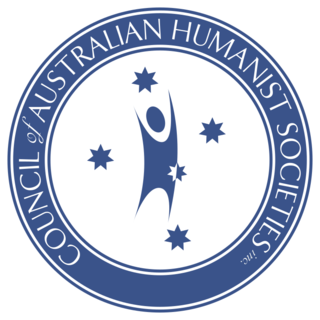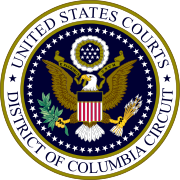Secular humanism is a philosophy, belief system, or life stance that embraces human reason, logic, secular ethics, and philosophical naturalism, while specifically rejecting religious dogma, supernaturalism, and superstition as the basis of morality and decision-making.
Religious humanism or ethical humanism is an integration of humanist philosophy with congregational rites and community activity that center on human needs, interests, and abilities. Religious humanists set themselves apart from secular humanists by characterizing the nontheistic humanist life stance as a non-supernatural "religion" and structuring their organization around a congregational model.

The National Secular Society (NSS) is a British campaigning organisation that promotes secularism and the separation of church and state. It holds that no one should gain advantage or disadvantage because of their religion or lack of it. The Society was founded in 1866 by Charles Bradlaugh.

The American Humanist Association (AHA) is a non-profit organization in the United States that advances secular humanism.
Nontheism or non-theism is a range of both religious and non-religious attitudes characterized by the absence of espoused belief in the existence of God or gods. Nontheism has generally been used to describe apathy or silence towards the subject of gods and differs from atheism, or active disbelief in any gods. It has been used as an umbrella term for summarizing various distinct and even mutually exclusive positions, such as agnosticism, ignosticism, ietsism, skepticism, pantheism, pandeism, transtheism, atheism, and apatheism. It is in use in the fields of Christian apologetics and general liberal theology.
Humanists UK, known from 1967 until May 2017 as the British Humanist Association (BHA), is a charitable organisation which promotes secular humanism and aims to represent "people who seek to live good lives without religious or superstitious beliefs" in the United Kingdom by campaigning on issues relating to humanism, secularism, and human rights. It seeks to act as a representative body for non-religious people in the UK.

Smith v. Board of School Commissioners of Mobile County, 827 F.2d 684, was a lawsuit in which the United States Court of Appeals for the Eleventh Circuit held that the Mobile County Public School System could use textbooks which purportedly promoted "secular humanism", characterized by the complainants as a religion.
Torcaso v. Watkins, 367 U.S. 488 (1961), was a United States Supreme Court case in which the Court reaffirmed that the United States Constitution prohibits states and the federal government from requiring any kind of religious test for public office, in this case as a notary public.

The Ethical movement is an ethical, educational, and religious movement established in 1877 by the academic Felix Adler (1851–1933). The premise of Ethical Culture is that honoring and living in accordance with a code of ethics is required to live a meaningful life and for making the world a better place for all people.

Humanists International is an international non-governmental organisation championing secularism and human rights, motivated by secular humanist values. Founded in Amsterdam in 1952, it is an umbrella organisation made up of more than 160 secular humanist, atheist, rationalist, agnostic, skeptic, freethought and Ethical Culture organisations from over 80 countries.

The Secular Coalition for America is an advocacy group located in Washington D.C. It describes itself as "protecting the equal rights of nonreligious Americans."
Secular ethics is a branch of moral philosophy in which ethics is based solely on human faculties such as logic, empathy, reason or moral intuition, and not derived from belief in supernatural revelation or guidance—a source of ethics in many religions. Secular ethics refers to any ethical system that does not draw on the supernatural, and includes humanism, secularism and freethinking. A classical example of literature on secular ethics is the Kural text, authored by the ancient Indian philosopher Valluvar.

The Council of Australian Humanist Societies (CAHS) is an umbrella organisation for Australian humanist societies. It was founded in 1965. It is affiliated with Humanists International. The official symbol of CAHS is the Happy Human.
A person's life stance, or lifestance, is their relation with what they accept as being of ultimate importance. It involves presuppositions and commitment to exercise it in theory and practice in one's life.
Fellowship of Humanity v. County of Alameda was a 1957 California Courts of Appeal case in the Fellowship of Humanity, an organization of humanists, sought a tax exemption from Alameda County, California on the ground that they used their property "solely and exclusively for religious worship." Despite the group's nontheistic beliefs, the court determined that the activities of the Fellowship of Humanity, which included weekly Sunday meetings, were analogous to the activities of theistic churches and thus entitled to an exemption.
Humanism is a philosophical stance that emphasizes the individual and social potential, and agency of human beings, whom it considers the starting point for serious moral and philosophical inquiry.
The Fellowship of Humanity is a humanist church in Oakland, California, founded in 1935 by Reverend A. D. Faupell as part of the American Religious Humanism movement. It was an offshoot of the First Unitarian Church of Oakland, where A. D. Faupell had been teaching Sunday school, and was inspired in part by Upton Sinclair’s campaign for governor of California under the banner of EPIC, End Poverty in California. It was one of several "Churches of Humanity" established in the 1930s but is the only one that has survived into the 21st century. It is the first and oldest affiliate of the American Humanist Association. It is currently described as a "Deep Green Humanist Church vital to progressive infrastructure, inspired by humanitarian ideals, and committed to action for social justice and ecological sanity."

Andrew James William Copson is a humanist leader and writer. He is the Chief Executive of Humanists UK and the President of Humanists International. He has worked for a number of civil and human rights organisations throughout his career in his capacity as executive committee member, director or trustee and has represented Humanist organisations before the House of Commons, the Organization for Security and Co-operation in Europe and the United Nations. As a prominent spokesperson for the Humanist movement in the United Kingdom he is a frequent contributor to newspaper articles, news items, television and radio programmes and regularly speaks to Humanist and secular groups throughout Britain. Copson has contributed to several books on secularism and humanism and is the author of Secularism: Politics, Religion, and Freedom.
Zubik v. Burwell, 578 U.S. 403 (2016), was a case before the United States Supreme Court on whether religious institutions other than churches should be exempt from the contraceptive mandate, a regulation adopted by the United States Department of Health and Human Services (HHS) under the Affordable Care Act (ACA) that requires non-church employers to cover certain contraceptives for their female employees. Churches are already exempt under those regulations. On May 16, 2016, the Supreme Court vacated the Court of Appeals ruling in Zubik v. Burwell and the six cases it had consolidated under that title and returned them to their respective courts of appeals for reconsideration.








